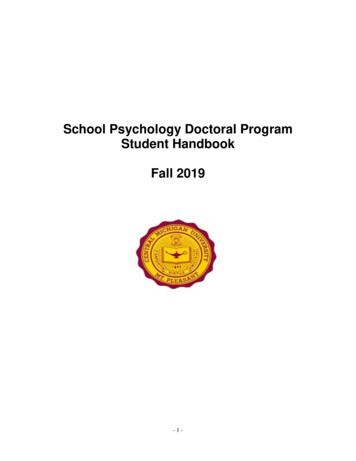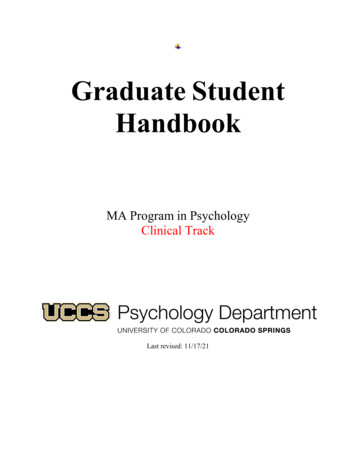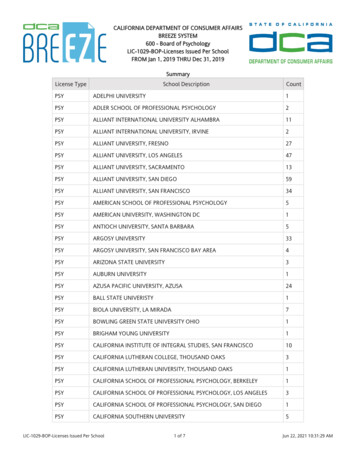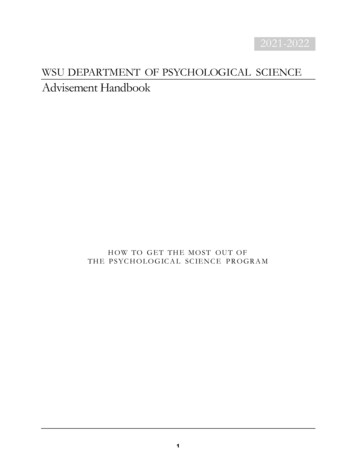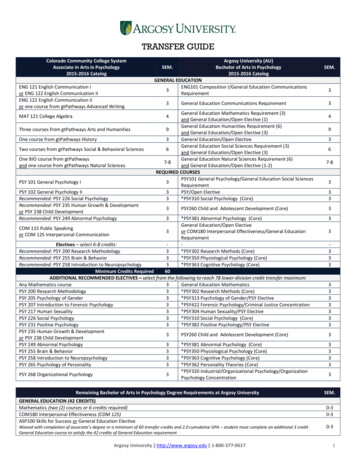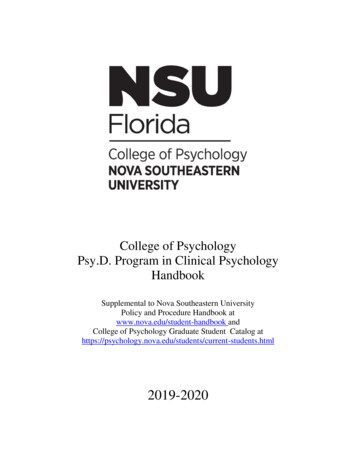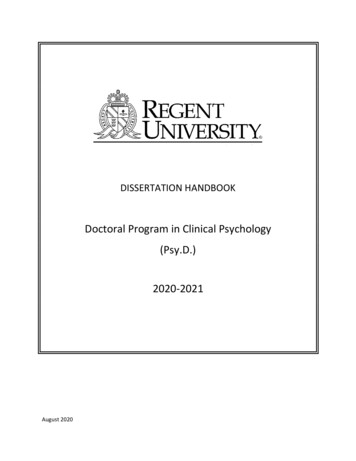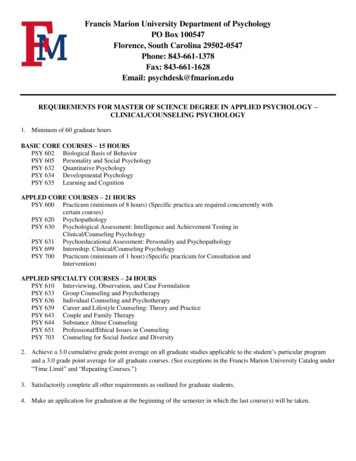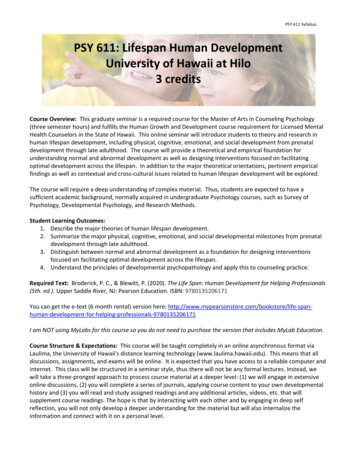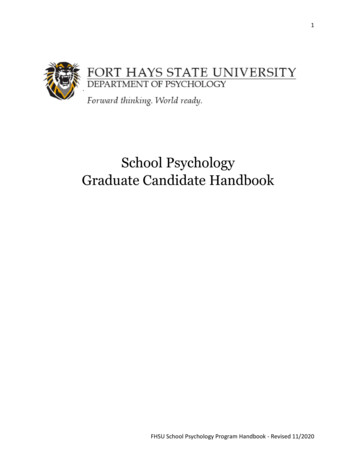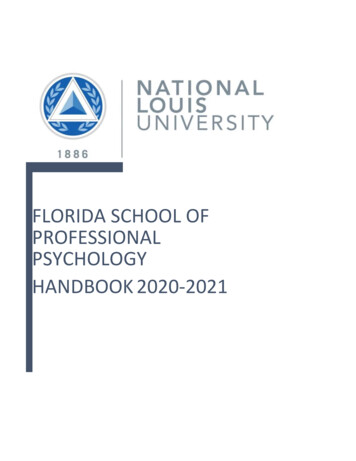
Transcription
PROGRAM HANDBOOKPsy.D. ProgramUpdated 8.26.2020
Welcome to the Psy.D. Program at Antioch University SeattleWelcome to the Doctorate of Clinical Psychology (Psy.D.) program in the School ofApplied Psychology, Counseling & Family Therapy (SAPCFT) at Antioch University Seattle.The Psy.D. Program Handbook provides an overview of the doctoral program to assiststudents in their studies.Antioch University Seattle (AUS) and the Doctorate of Clinical Psychology (Psy.D.)Program Faculty reserve the right to make changes in policy, regulations, degree requirements,and fees subsequent to the publication of this material. Such changes take precedence overprevious handbook and catalog statements. While reasonable effort is made to publicize suchchanges, students should remain in close touch with department advisors and administrativeoffices because responsibility for complying with all applicable requirements ultimately restswith the student. Updated copies of the handbook will be posted to the Sakai Psy.D.Community site on an ongoing basis.Program Handbook2
Contents(Click on Heading Travel to Respective Text)Contents . 3Introduction. 5Mission Statements . 5Antioch University Seattle. 5School of Applied Psychology, Counseling and Family Therapy (SAPCFT) . 5Doctorate of Psychology in Clinical Psychology Program (Psy.D.). 6Psy.D. Program Overview . 6Psy.D. Program Philosophy . 6Program aims and student learning objectives (SLO) . 8Psy.D. Program Competencies. 9Psy.D. Program Graduation Requirements . 26Course Scheduling, Class Size, and the Year-at-a-Glance (“The YAG”) . 26Overview of Curricula and Clinical Training Sequence . 27Psy.D. Program Admission . 28Course of Study and Clinical Training Sequence . 34Multicultural Competency Training . 34Psychological Assessment . 35Interventions . 36Professional Seminars . 36Research Methods and Analysis . 37Biological Bases of Behavior . 38Core (Required) Courses . 38Elective Offerings . 39Pre-internship II. 40The Clinical Competency Examination . 40Non-terminal Master’s degree (MA) in Psychology en passant . 40Saturday Community Meeting . 41Psychotherapy Requirement . 41The Doctoral Dissertation . 42Internship eligibility qualification . 43Optional Advanced Pre-internship . 44Clinical Internship . 44Graduation. 44Licensing and Accreditation Requirements . 45Student Life and Academic Policies . 50Credit Transfers and Waiver Policy . 50Waiver Request Procedure . 50Student-Faculty Relations . 50Communication via Email and Psy.D. Program Sakai Intranet . 51Self-Disclosure . 51Professional Conduct of Students . 51Program Handbook3
Academic Progress . 51Academic Action for Unsatisfactory Progress . 52Annual Review and Faculty Evaluation of the Student’s Progress. What is it? . 57Special Review Process . 63Psy.D. Student Council. . 64Mentorship Program . 64Student Membership in Professional Organizations . 65Faculty Accessibility . 65Faculty Academic Advisement. 65Student Advising Files and Record Access Policy . 65Clinical Training Advisement . 66Student-Faculty Collaborative Research . 67Disability Support Services (DSS) . 67Financial Aid . 67Professional Liability and Medical Health Insurance for Students . 67Student Academic Rights and Freedom . 68Student Conduct Policy . 68Student Grievance Policy and Procedure . 68Academic Appeal (Grievance) Policy . 68Student Academic Integrity . 69Academic Freedom Policy . 69Sources of Student Learning Outcomes (SLO) . 69Psy.D. Program Outcomes (PO) . 70Program Self-Improvement . 73Program Handbook Signature Form . 75Program Handbook4
IntroductionAntioch University Seattle is one of five campuses of Antioch University (AU), a notfor-profit organization founded in 1852 with Horace Mann as its first president. AU alsoincludes Antioch University New England, Antioch University Los Angeles, AntiochUniversity Santa Barbara, and Antioch University Midwest. The AU central offices are inYellow Springs, OH. Each campus has its own community life and regional identity. AUSopened its doors in October 1975.Antioch University is accredited by the Higher Learning Commission of the NorthCentral Association of Colleges and Schools, 230 South LaSalle Street, Suite 7-500, Chicago,IL, 60604-1411, (800) 621-7440. AU was reaccredited in 2013. AUS is authorized by theWashington Higher Education Coordinating Board and meets the requirements and minimumeducation standards established for degree-granting institutions under the Degree-GrantingInstitutions Act.The Doctoral Program in Clinical Psychology is accredited by the American PsychologicalAssociation. Questions related to the program’s accredited status should be directed to theCommission on Accreditation at Office of Program Consultation and Accreditation, AmericanPsychological Association, 750 1st Street, NE, Washington, DC 20002, Phone: (202) 3365979. E-mail: apaaccred@apa.org Web: www.apa.org/ed/accreditationAntioch University Seattle (AUS) programs are guided by core educational values thatinclude rigorous scholarship and academic discipline, engaged service, communityinvolvement, and student-centered, well-rounded learning. Antioch is committed to finding themost effective approaches to student learning through innovation and experimentation;students are encouraged to integrate work and study, to incorporate experience with academicstudy and reflection, and to address issues within a social and political context. AUS aims todevelop its students and graduates into responsible leaders personally committed to improvingthe human condition by fostering productive, democratic change in the institutions andcommunities in which they live and work.Mission StatementsAntioch University SeattleAntioch University provides learner-centered education to empower students with theknowledge and skills to serve others, lead meaningful lives, and to advance social, economic,and environmental justice.School of Applied Psychology, Counseling and Family Therapy (SAPCFT)The mission of the School of Applied Psychology, Counseling and Family Therapy isto provide higher education and training in the theory and application of psychology in avariety of settings. Our curriculum promotes the values of ethical practice, socialresponsibility, and cultural pluralism; our classes promote self-exploration, agentic activity,Program Handbook5
interdisciplinary and whole-person learning. We seek to balance traditional and contemporaryperspectives in the field of psychology. We aspire to educate students to become informed andeffective practitioners and change agents in our complex world.Doctorate of Psychology in Clinical Psychology Program (Psy.D.)The Psy.D. program at Antioch University Seattle prepares students for competententry as a generalist into the practice of health service psychology through doctoral educationand training. The Psy.D. program aims to educate students as health service psychologists andas scholars in psychology in order to promote health, education, social justice, and humanwelfare. Our curricula shall advance students in the broadest and most liberal manner,including conducting research in psychology. We seek to promote the highest standards ofethics, conduct, education, and achievement in a manner that balances traditional andcontemporary perspectives in order for students to become responsible change agents in ourcomplex world.Psy.D. Program OverviewAntioch University Seattle’s (AUS) Psy.D. Program adopts a practitioner-scholarmodel that emphasizes generalist clinical training along with a foundation in research designand evidence-based practices to educate students as competent professionals in clinicalpsychology and as scholars in psychology in order to promote health, education, social justice,and human welfare.The faculty is committed to including issues of diversity (including race, age, gender,physical status, ethnicity, culture, class, sexual orientation, and disability) throughout thecurriculum. The program does not isolate these issues into one or two courses or workshopsbut, instead, distributes the responsibility for addressing these issues across course andexperiential learning.Course-based learning provides both breadth and depth of knowledge fundamental tothe clinical practice of psychology. The experience-based learning gives students theopportunity to apply their knowledge in the delivery of treatment interventions to people.Skills to work effectively on inter-professional, multi-disciplinary teams are included.The program is organized into 140 credits delivered in an 11-week quarter system withclasses held on Thursdays, Fridays and Saturdays. The clinical experiential learning isdelivered through supervised work at the AUS Community Counseling and Psychology Clinicand other community clinical training placements.Psy.D. Program PhilosophyThe AUS Psy.D. program’s education and training model is that of PractitionerScholar, which is based on the 1973 clinical psychology training model proposed at theProgram Handbook6
historic Vail Conference on Professional Training in Psychology in Vail, Colorado, and theProfession-Wide Competencies and Discipline-Specific Domains from the AmericanPsychology Association. We are also guided by the competency-based model developed bythe National Council of Schools and Programs of Professional Psychology (NCSPP) asarticulated by Kenkel and Peterson (2010). The highlights of the model are as follows:Local clinical scientist approach. We train our students in evidence-based practice inpsychology (EBPP), defined as “the integration of the best available research with clinicalexpertise in the context of patient characteristics, culture, and preferences” (APA, 2005). Tohelp students identify “the best available research,” our curriculum includes four researchcourses designed to teach students the continuum of research designs and data analyticapproaches, to think critically about the ways such approaches are applied within mainstreampsychology literature. Students are taught to participate in research teams and projects and tomeasure the outcomes of their therapeutic work and implement the various process andoutcome measures that are available at the on-campus clinic. In accordance with APA’s policyon evidence-based psychology practice, we emphasize the need to hold the science and localcontext in a dialectic rather than dichotomy. More specifically, this will provide students withthe opportunity to learn how to understand the client and the presenting issues within asystems context embodied by social, cultural, psychological, and political factors. Thisincludes consideration of the complex and nuanced ways in which the client's and theclinician's background -- their family, work, culture, spiritual tradition, and social class -contribute to the interpretation and understanding of themselves and the ways in which theyinteract with world around them.Integrative andragogy. We prefer the term andragogy (structuring learning to engageadult rather than child learners; Knowles, Holton, & Swanson, 2005). AU is well known foracknowledging the experience adult students bring, integrating theory with practice, andframing individuals and social institutions in terms of an analysis of the history of power andprivilege. Our syllabi are the best means to demonstrate our teaching approaches. Classesrarely rely on the standard multiple-choice midterm and final examinations only, but ratherrequire students to reflect upon, critique, and apply what they have learned in writtenassignments or presentations.Competency-based assessment. We believe students should be asked to demonstratethe disciplinary content they learn through applying knowledge to practice. By using small,seminar-type classes and assignments that require reflective application of concepts to realcases and problems, instructors are able to assess their students’ competent performances.Student mastery of competency is woven into all course objectives and evaluations, supervisorevaluations, annual reviews of student performances, and the Clinical CompetencyExamination (resources and handbook available at Sakai/Psy.D. CommunitySite/Resources/Clinical Competency Examination). In addition to the Profession-WideCompetencies, the Discipline-Specific Knowledge requirements guide our curriculardevelopment.Program Handbook7
Multiple roles. In addition to providing psychotherapeutic interventions andassessment services for individuals and groups, many of our graduates will be involved insupervision, consultation, agency management, organizational planning, program evaluation,health service provision, and public health activities during their careers. International crisisand trauma care are roles that our students may assume in the future. Thus, in agreement withthe National Council of Schools of Professional Psychology (NCSPP) competency-basedmodel, we train our students for the roles they are likely to take on in their communities.Social justice and social responsibility. Antioch University (AU) has a 158-yearhistory of opening the doors of higher education to those who have been closed out. AUclinical psychology Psy.D. program strives to provide high-quality mental health care servicesto populations who have been underserved as well. As part of these aspirations, multiculturalcompetency training is a focus throughout the curriculum in order to prepare our students tobecome engaged citizens and culturally competent practitioners.Program aims and student learning objectives (SLO)The overarching goal of the Psy.D. program is to prepare students for competent entryinto the practice of health service psychology and meet Washington State’s licensurerequirements for clinical psychology. To accomplish this, we have identified three broad aimsand nine objectives listed below:Aim #1. Graduates are competent for entry-level practice as health service providers andprofessional psychologists in multiple roles. Student Learning Outcomes or Objectives (SLO1.A-1.D):Objective 1.A: Students intervene to alleviate suffering and promote health.Competency: InterventionObjective 1.B: Students assess clients and communicate their findings.Competency: AssessmentObjective 1.C: Students design, analyze, and report on research and evaluations.Competency: ResearchObjective 1.D: Students accept and offer supervision and consultation.Competency: Supervision & ConsultationAim #2. Graduates are reflective practitioner/scholars. Student Learning Outcomes orObjectives (SLO 2.A-2.C):Objective 2.A: Students build meaningful relationships with clients, organizations, andtheir community.Competency: Communication and Interpersonal SkillsObjective 2.B: Students integrate science with theory and practice.Competency: Assessment and InterventionObjective 2.C: Students practice ethically and professionally.Competencies: Ethical/Legal Standards & ProfessionalismAim #3. Graduates are socially responsible and work for social justice. Student LearningOutcomes or Objectives (SLO 3.A-3.B):Program Handbook8
Objective 3.A: Students celebrate diversity and avoid oppressing others.Competency: Social Justice & Individual/Cultural DiversityObjective 3.B: Students are agents of social change.Competency: Social JusticePsy.D. Program CompetenciesThe AUS Psy.D. program has adopted the Profession-Wide Competencies (APA,2017) throughout the program, including the curriculum, clinical training, and dissertation. Inaddition, the Discipline-Specific Knowledge domains in curricular design and implementation.Below are tables describing the domain, how it is integrated into the program, and how theyare assessed:Profession-Wide Competencies (PWC)Provide information below to illustrate how the program ensures that ALL students can acquireand demonstrate substantial understanding of and competence in:Competency:(i) ResearchElements associated Demonstrate the substantially independent ability to formulatewith this competencyresearch or other scholarly activities (e.g., critical literaturefrom IR C-8 Dreviews, dissertation, efficacy studies, clinical case studies,theoretical papers, program evaluation projects, programdevelopment projects) that are of sufficient quality and rigor tohave the potential to contribute to the scientific, psychological, orprofessional knowledge base. Conduct research or other scholarly activities. Critically evaluate and disseminate research or other scholarlyactivity via professional publication and presentation at thelocal (including the host institution), regional, or national level.Program-defined elements associatedwith this competency(if applicable; seetable descriptionabove)Required Students demonstrate the independent ability to formulatetraining/experientialresearch or other scholarly activities by successfully completingactivities to meetPSYC7310 Research Ethics & Quantitative Methods and Analysis I,each element. IfPSYC7320 Quantitative Methods and Analysis II, PSYC7330applicable, clarifyQualitative Methods and Analysis I, PSYC7340 Qualitativewhere activityMethods and Analysis II.description (e.g., Students demonstrate that they can conduct research or othersyllabus) is located.scholarly activities by completing The PSYC7340 QualitativeMethods and Analysis II course and their dissertation. Students demonstrate the ability to critically evaluate anddisseminate research or other scholarly activity by completing thefinal public dissertation defense and dissertation publication.Program Handbook9
How outcomes aremeasured for eachtraining/experientialactivity listed above.List where in the selfstudy all associatedevaluation tools arelocated.Minimum levels ofachievement (MLAs)for each outcomemeasure/evaluationtool listed above.Competency:Elements associatedwith this competencyfrom IR C-8 DProgram-definedelements associatedwith this competency(if applicable)Requiredtraining/experientialactivities to meeteach element. Ifapplicable, clarifywhere activitydescription (e.g.,syllabus) is located.How outcomes are measured: Performance in PSYC7310 andPSYC7330 Performance in PSYC7320 andSYC7340 Performance in the finaldissertation defense. Evaluation tool and selfstudy location: Rubrics in the coursesyllabi for PSYC7310,PSYC7320, PSYC7330,PSYC7340. Dissertation defenserubric in theDissertationHandbook(Appendix B).Successful completion of PSYC7310, PSYC7320, PSYC7330,PSYC7340 designated by Pass (equivalent of B- or better).Achieving a 2 or higher on all items for all meetings on thedissertation defense form rubric.Publication of dissertation via OhioLink.(ii) Ethical and legal standards Be knowledgeable of and act in accordance with each of thefollowing:o the current version of the APA Ethical Principles ofPsychologists and Code of Conduct;o Relevant laws, regulations, rules, and policies governinghealth service psychology at the organizational, local,state, regional, and federal levels; ando Relevant professional standards and guidelines. Recognize ethical dilemmas as they arise, and apply ethicaldecision-making processes in order to resolve the dilemmas. Conduct self in an ethical manner in all professional activities. Students demonstrate knowledge of the current version of theAPA Ethical Principles of Psychologists and Code of Conduct;Relevant laws, regulations, rules, and policies governing healthservice psychology at the organizational, local, state, regional, andfederal levels; and Relevant professional standards and guidelinesin PSYC7300 Ethics and 7450 Advanced Ethics.Students demonstrate the ability to recognize ethical dilemmas asthey arise, and apply ethical decision-making processes in orderto resolve the dilemmas in the ethical vignette of the ClinicalCompetency Exam.Students conduct themselves in an ethical manner in allprofessional activities through the clinical training sequence.Program Handbook10
How outcomes aremeasured for eachtraining/experientialactivity listed above.List where in the selfstudy all associatedevaluation tools arelocated.Minimum levels ofachievement (MLAs)for each outcomemeasure/evaluationtool listed above.Competency:Elements associatedwith this competencyfrom IR C-8 DProgram-definedelements associatedHow outcomes are measured: Performance in PSYC7300 andPSYC7450. Performance on the ethicalvignette of the ClinicalCompetency Exam. Performance in clinicaltraining. Evaluation tool and selfstudy location: Rubrics in the coursesyllabi for PSYC7300and PSYC7450. Clinical CompetencyExam scoring criteriafor both the writtenand oral componentin the CCE handbook(Appendix D, E & F). SummativeSupervisorEvaluation Form.Successful completion of PSYC7300 and PSYC7450 designated byPass (equivalent of B- or better).A rating of Pass on the ethical domain and a rating of Pass on theoverall Clinical Competency Exam.Ratings of 3 (Meets Expectations) or above on all learningelements of the Ethics domain of the Summative SupervisorEvaluation Form.(iii) Individual and cultural diversity An understanding of how their own personal/cultural history,attitudes, and biases may affect how they understand andinteract with people different from themselves. Knowledge of the current theoretical and empirical knowledgebase as it relates to addressing diversity in all professionalactivities including research, training, supervision/consultation,and service. The ability to integrate awareness and knowledge of individualand cultural differences in the conduct of professional roles (e.g.,research, services, and other professional activities). This includesthe ability apply a framework for working effectively with areas ofindividual and cultural diversity not previously encountered overthe course of their careers. Also included is the ability to workeffectively with individuals whose group membership,demographic characteristics, or worldviews create conflict withtheir own. Demonstrate the requisite knowledge base, ability to articulatean approach to working effectively with diverse individuals andgroups, and apply this approach effectively in their professionalwork. Program Handbook11
with this competency(if applicable)Requiredtraining/experientialactivities to meeteach element. Ifapplicable, clarifywhere activitydescription (e.g.,syllabus) is located.How outcomes aremeasured for eachtraining/experientialactivity listed above.List where in the selfstudy all associatedevaluation tools arelocated.Minimum levels ofachievement (MLAs)for each outcomemeasure/evaluationtool listed above.Competency:Elements associatedwith this competencyfrom IR C-8 DStudents demonstrate an understanding of how their ownpersonal/cultural history, attitudes, and biases may affect howthey understand and interact with people different fromthemselves through the PSYC7030 Cultural Competency &Humility in Clinical Psychology course. Students demonstrate knowledge of current theoretical andempirical knowledge base as it relates to addressing diversity inall professional activities including research, training,supervision/consultation, and service through the PSYC7030course. Student demonstrate the ability to integrate awareness andknowledge of individual and cultural differences in the conduct ofprofessional roles through the PSYC7030 course and the diversitydomain of Clinical Competency Exam. Students demonstrate the requisite knowledge base, ability toarticulate an approach to working effectively with diverseindividuals and groups, and apply this approach effectively in theirprofessional work through the clinical training sequence and thediversity domain of the Clinical Competency Exam.How outcomes are measured:Evaluation tool and selfstudy location: Performance in PSYC7030. Rubrics in the course Performance on the Clinicalsyllabus for PSYC7030.Competency Exam. Clinical Competency Performance in clinicalExam scoring criteriatraining.for both the writtenand oral componentin the CCE handbook(Appendix D, E & F). SummativeSupervisorEvaluation Form. Successful completion of PSYC7030 designated by Pass(equivalent of B- or better). A rating of Pass on the individual and cultural
Antioch University Seattle . Antioch University provides learner-centered education to empower students with the knowledge and skills to serve others, lead meaningful lives, and to advance social, economic, and environmental justice. School of Applied Psychology, Counseling and Family Therapy (SAPCFT)
